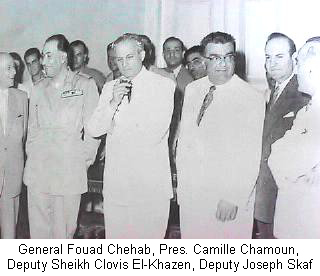 In 1958 Camille Chamoun�s Presidency terms was coming to an end , thus a new President had to be elected, according to the Lebanese Constitution (1926) a President cannot be re-elected unless there is another term in between. Camille Chamoun lobbied to get the Lebanese Deputies of Parliament to amend the constitution in a way that allows him to be re-elected. The majority refused and when the plot was uncovered a popular uprising occurred against the President and his followers.
In 1958 Camille Chamoun�s Presidency terms was coming to an end , thus a new President had to be elected, according to the Lebanese Constitution (1926) a President cannot be re-elected unless there is another term in between. Camille Chamoun lobbied to get the Lebanese Deputies of Parliament to amend the constitution in a way that allows him to be re-elected. The majority refused and when the plot was uncovered a popular uprising occurred against the President and his followers.
The Uprising and the unpopularity of the President was due to two main reasons in addition to the Parliamentary plot :
In 1957 (one year earlier during an Arab Summit in Beirut) President Chamoun had publically supported the French-British-Israeli failed invasion of Egypt to reclaim the Suez Canal after Gammal Abdul Nasser had seized it. Nasser was very popular in the Arab world and Lebanon, therefore supporting any action that Israel is involved in is not a recommended thing to do by a Lebanese President.
Before his election in 1952, Chamoun was known to be an "Socialist Arab Nationalist", after his election he started showing signs of Christian Extremism undermining the delicate religious balance in the country. This policy was not welcomed, not even by the majority of Christians, as for the minority of Christians who did support him, Chamoun had convinced them that they were a minority in the Middle-East and that they should protect their rights from threats such as Nasser.
The opposition to Chamoun was initially led by Deputy Hamid Franjiye (A Christian Maronite) in a coalition with Rashid Karame, Saeb Salam (Two Muslims) and Kamal Joumblatt (A Druze). Hamid Franjiye became ill and unable to resume his political life, the others carried on the opposition which made it look like a religious opposition due to the lack Christian leadership in that opposition.
Sadly the country was divided . When President Chamoun saw the weakness of his position he ordered General Chehab (at the time commander in chief of the Armed Forces) to command the Army out of the barracks and into the streets to impose a curfew. General Chehab categorically refused saying that the Lebanese Army was founded to protect the People & not to be used against them, the Army is there to serve the people & not the quest of a selfish President.
Camille Chamoun turned to his last resource : The United States of America. Claiming that the uprising was fueled by Egyptian President Gamal Abdul Nasser (Prominent Arabian nationalism figure at the time and leading enemy to America�s prot�g� : Israel) he called upon the Americans to defend his country (as he claims) from Nasser�s Socialist influence. The Americans on the other hand , saw an opportunity to have their Military Forces in a country neighboring Israel which will give them better control and a chance for a quick response in case Israel is attacked by any Arab country. The American Naval Marine Forces disembarked on the Lebanese shores of Ouza� (just south of Beirut) in 1958, while the American Sixth Fleet was in Lebanese International waters. But mounting pressures in the Korean front & the rising threat of Fidel Castro�s communist rebellion in Cuba forced the Americans to seek a political & diplomatic solution to Lebanon instead of a military stand-off . therefore it was agreed between the Americans & Nasser that this is an internal Lebanese matter & that democracy should take its course & the Lebanese People will have to decide on a new President.
General FOUAD CHEHAB was elected President in 1958, The American Forces withdrew from Lebanon and what is to be known later as the Golden Era of Lebanon had just begun.
C E D A R L O R D
|



 In 1958 Camille Chamoun�s Presidency terms was coming to an end , thus a new President had to be elected, according to the Lebanese Constitution (1926) a President cannot be re-elected unless there is another term in between. Camille Chamoun lobbied to get the Lebanese Deputies of Parliament to amend the constitution in a way that allows him to be re-elected. The majority refused and when the plot was uncovered a popular uprising occurred against the President and his followers.
In 1958 Camille Chamoun�s Presidency terms was coming to an end , thus a new President had to be elected, according to the Lebanese Constitution (1926) a President cannot be re-elected unless there is another term in between. Camille Chamoun lobbied to get the Lebanese Deputies of Parliament to amend the constitution in a way that allows him to be re-elected. The majority refused and when the plot was uncovered a popular uprising occurred against the President and his followers.

